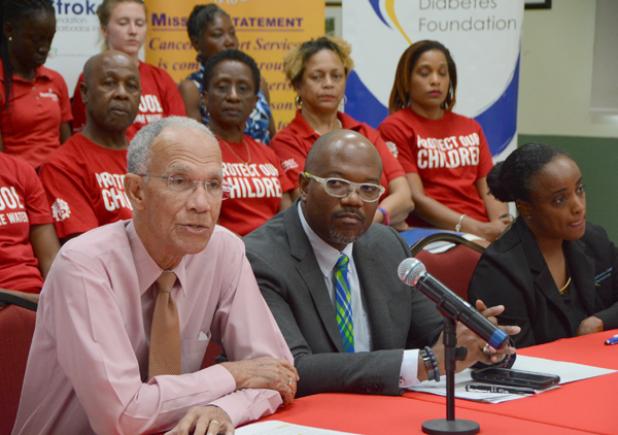
From left: President of the Healthy Caribbean Coalition, Government of Barbados Special Envoy on NCDs and Chairman of the Barbados National NCD Commission, Sir Trevor Hassell, spoke passionately about the urgent need to tackle the national childhood obesity problem, with the understanding that it would take time, while
President of the Heart and Stroke Foundation, Dr. Kenneth Connell and Dr. Diane Brathwaite, Clinical Director of the Barbados Diabetes Foundation, look on.
Fighting Obesity
Yesterday, the Barbados Childhood Obesity Prevention Coalition joined with local and international health NGOs across the globe to mark the first unified World Obesity Day.
Under the theme “The Roots of Obesity Run Deep”, the day marked a heightened call for a global response to the critical challenge of obesity and its link to the increasing onslaught of Non-communicable Diseases (NCDs). In a media briefing held at the 3Ws Oval at the University of the West Indies, Cave Hill Campus, the Coalition lauded Barbados and CARICOM governments for the swift and diligent response to the World Health Organisation (WHO) as the world seeks to minimise the impact of COVID-19.
The Coalition, however, believes that the governments must also respond in similar fashion to the pervasive and ongoing threat of non-communicable diseases as declared by the very same World Health Organisation.
In Barbados eight out of ten deaths are due to NCDs, 16% of which are premature deaths. The alarming concern is that 1 in 3 children in Barbados is overweight or obese, placing them at an increased risk for the onset of NCDs. According to the World Obesity Federation, Barbados has a 1% chance of meeting the World Health Organisation target of “no increase in childhood obesity prevalence by 2025”. The Child Obesity Risk Score of Barbados was also reported by the Atlas of Childhood Obesity, as 7.5/11.
Sir Trevor Hassell, President of the Healthy Caribbean Coalition (HCC), Government of Barbados Special Envoy on NCDs and Chairman of the Barbados National NCD Commission, was present at the briefing. Sir Trevor explained that the WHO released a report with one of the focuses being the encouragement of governments to implement policies to aid in reducing child obesity.
“The World Health Organisation recently produced a report from the Commission on Ending Childhood Obesity, in which emphasis was placed on the need for government-led policy, together with public education and action.”
Sir Trevor went on to outline the key areas from the Commission report as the promotion of the intake of healthy foods, the preconception and pregnancy care of a high quality, early childhood diet and physical activity, health, nutrition and physical activity for school-age children and weight management.
The Coalition has formulated ideas which could be used as a guide for policy building and as Sir Trevor mentioned, were intricate for the policy truly to be of a meaningful nature. The taxation of unhealthy foods, mandatory frontal package nutrition labelling, banning the marketing and sales of unhealthy foods to children including at schools, are some of these policy actions.
Sir Trevor also challenged the public of all backgrounds to eat healthy, despite the consensus that eating healthy is too expensive and all societal classes would not be able to make the necessary healthy changes.
“We need to get back to eating simple. We need to get back to eating ground provisions. We need to get back to that form of eating and that is true whether we are millionaires or we are not millionaires.”
The path may seem difficult, especially when it comes to “sweet drinks” (sodas) and tackling childhood obesity in light of the results from the Atlas showing that by 2030, it is expected that in Barbados 25% of children ages 5 to 9 will be obese while ages 10 to 19, the percentage is expected to be 19.8%. The president of the HCC, however, highlighted that there was a success story already in history.
“The use of tobacco smoke, the smoking of cigarettes in Barbados has reduced significantly in the last 40 years or so. At the same time, there has been a significant reduction in the prevalence of the disease that is most commonly associated with cigarette smoking, which is cancer of the lungs.”
The process has begun already in Barbados after the 10% tax on sugar-sweetened beverages resulted in a drop in overall sales, while there was an increase in sales of non-sugar-sweetened beverages and bottled water.
